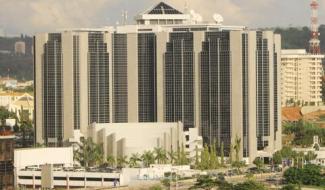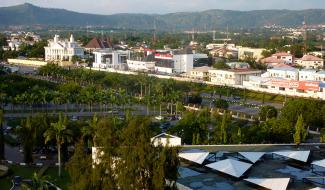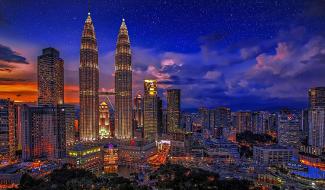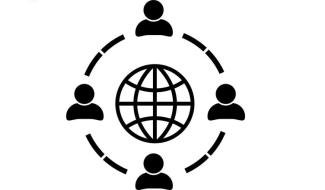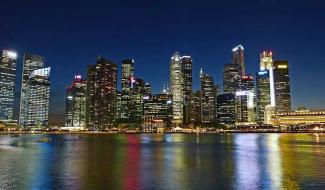
Nigeria, formally known as the Federal Republic of Nigeria, is a country in West Africa, which turns out to be Africa's biggest economy, growing more than 6-7% every year. Nigeria is the most crowded country in Africa, and the seventh generally crowded on the planet, with a tremendous base of the youthful populace. The main part of the country's economy depends on oil export, with some cocoa and elastic likewise being exported.
Nigeria is the biggest market in sub-Saharan Africa, with a sensibly gifted labour force for the solid administration of investment projects in the country. Moreover, it is associated with a comprehensive organization of motorable the entire season streets, rail line tracks, inland streams, sea and air transportation.
If you want to form a company in Nigeria, you must be aware of all the fruitful sectors present in the country. Once you get a basic idea about the industry in Nigeria, then you can proceed with your investment.
Oil and Gas
Nigeria is the biggest oil producer in Africa, holds the biggest gaseous petrol saves on the mainland, and is among the world's best five exporters of melted flammable gas (LNG). In 2018, the petrol area contributed 8.60% to Nigeria's GDP however represented roughly 90% of Federal Government pay. In the main quarter of 2019, the oil area contributed 9.14% to the country's GDP, as revealed by the National Bureau of Statistics.
Billions of dollars financially past due are as of now owing to its joint endeavour accomplices. As of March 2019, the Government of Nigeria had paid about $1.5 billion of the $5.1 billion money call overdue debts to date. Nonetheless, this low pace of money call instalments joined with remiss agreement authorization, an absence of administrative clearness, and great and expensive functional dangers have obliged development and investment in this area.
The administrative climate for international oil organizations in Nigeria is additionally influenced by the Nigerian Oil and Gas Industry Content Development Act of 2010. Under the Act, Nigerian autonomous administrators are given first thought in honour of oil projects in Nigeria. What's more, worldwide organizations working through Nigerian auxiliaries should exhibit that at least half of the hardware utilized is possessed by Nigerian auxiliaries.
Nigeria has probably the biggest flammable gas stores on the planet with 180 trillion cubic feet of demonstrated stores, yet the nation has been not able to prepare that gas for the domestic market. Political obstruction, inability to administer on main points of contention, and a conflicting way to deal with managing the cost of gas aggregately prevented the fundamental investment from catching and conveying gas to domestic business sectors.
In April 2016, the Nigerian National Petroleum Corporation (NNPC) opened an offering interaction to renovate its treatment facilities. A consortium of organizations, including General Electric, were occupied with conversations with the NNPC. As a result, as of March 2019, a couple of arrangements have been reached to redo the Port Harcourt treatment facility.
Different configurations are being set up to guarantee that the other three treatment facilities are redone. This would build the practical limit of the processing plants from their current 60% to 90% permitting Nigeria to improve the absolute introduced refining limit of 445,000 BPD it has. Also, an exclusive processing plant with an introduced limit of 650,000 BPD is required to start working in 2020.
Learn all about company registration in Nigeria on our blog.
Power Sector
The power area neither fulfils the current need of the nation's populace and organizations nor conveys continuous, dependable power. Today, 23 network associated creating plants are in the country with a complete introduced limit of 12,500 megawatts (MW) with an everyday functional normal close to 4,000 MW.
The Government intends to further develop admittance to power from 45% to about 90% by 2030, and through series of power area changes and strategies, drives are centred around advancing effectiveness in the area to draw in private investment, increment age, and resolve basic issues antagonistically affecting the area.
The Nigerian power industry, from power age to dissemination, is generally privatized. The power area isn't creating sufficient money from customers to take care of the expense of producing and conveying power, leaving age, transmission, and circulation organizations with working shortages. Also, the absence of reasonable long haul financing is hampering investment in framework overhauls.
Regardless of difficulties, there have been estimated upgrades in the business. The Azura-Edo 461MW autonomous power project became functional in May 2018 and right now conveys up to 10 per cent of the country's on-matrix power. Nevertheless, power production is still imperfect as information for May and June 2019 show that around 3,754 MW/h and 3,697/h MW were produced in the two months individually.
Infrastructure
Nigeria's openly possessed and worked transportation foundation is a significant imperative to the economic turn of events. The chief ports are Lagos (Apapa and Tin Can Island), Port Harcourt, and Calabar.
While the Government of Nigeria has opened the ports area for investment by the private area, the Government actually deals with the rail and streets areas to guarantee viable administration and activity through concession arrangements.
A legitimate and sound system and changes are expected to permit Public and Private Partnerships (PPPs) to push ahead in the rail and streets area. Of the 50,000 kilometres of streets, just somewhat in excess of 10,000 kilometres are cleared, and a considerable lot of these cleared streets are in a helpless condition.
Just five of Nigeria's 22 air terminals—Lagos, Kano, Port Harcourt, Enugu, and Abuja—at present get international business flights. Pilgrimage flights fly out of Yola to Saudi Arabia, yet these are contract flights. Lagos is running after building up itself as a local centre point.
Nigeria's railroad as of now has eight lines that are somewhat in excess of 2,000 miles in length aggregately. These rail routes require significant restoration, modernization, and extension. In 2010, the Government of Nigeria dispatched a 25-year vital arrangement to resuscitate the country's railroad framework and charged different rail line projects through concession concurrences with state-possessed Chinese organizations.
A significant number of these tasks have never reached financial close because of basic debasement issues in the acquisition interaction and public-area foundation subsidizing deficiencies. The Lagos-Abuja line, the Kaduna-Abuja traveller line and the Kaduna-Abuja line are the lone three functional lines at present. An American organization provided 25 trains for the Lagos-Abuja line.
In April 2018, the Government of Nigeria and General Electric (GE) marked a $45 million between time rail concession (while arranging a $2 billion admission to supply and work trains) to restore the Lagos to Kano rail line. The between time concession may develop to incorporate the Port Harcourt to Maiduguri line.
Nigeria has plans to take part in the AfricaRail project by overhauling the check of the rail lines reliable with adjoining rail frameworks. AfricaRail is a venture to restore and build twelve hundred new miles of the rail line connecting Cote d'Ivoire, Burkina Faso, Niger, Benin, Togo, and Nigeria at an expected expense of $2 billion.
Services
Nigeria's administrations yield positions as the 63rd biggest worldwide and fifth most prominent in Africa. The capability of the Nigerian financial administrations' area stays enormous, and foreign banks are turning out to be progressively drawn to the market.
Be that as it may, most of Nigeria's populace has just restricted admittance to financial administrations – an issue compounded by undeniable degrees of organization needed to finish even basic exchanges. Nevertheless, the Nigerian Government means to push ahead with changes of the protection and benefits businesses.
Consumer Products
Nigeria is an undeniably important market and assembling community for the African purchaser product area. Nigeria is currently home to a developing working-class presently assessed to be around 50 million, and it is a good forerunner in the territorial economic gathering ECOWAS and regionalization endeavours. Consequently, there is a broad scope of quick U.S. products in the Nigerian market from both huge and small organizations.
The guarantee of this market has upheld a few U.S. organizations' assembling plants in Nigeria. However, significant difficulties to organizations in the buyer products area in Nigeria incorporate protectionist approaches and the absence of satisfactory licensed innovation rights assurance.
Read about sole proprietorship in Nigeria on our blog.
Information and Communications Technology (ICT)
Nigeria is Africa's biggest ICT market, accounting for 29% of web use in Africa. In June 2018, the Nigerian Communications Commission revealed that Nigeria had in excess of 160 million dynamic versatile telecoms endorsers of GSM and CDMA. Versatile GSM supporters represent 98.37% of the total telecom endorsers.
Fibre optic extension is presently occurring in Lagos and Abuja; nonetheless, development in provincial regions keeps on being hampered as telecom suppliers anticipate forthcoming enactment on "option to proceed" security for telecom framework.
There are four principal GSM networks in Nigeria: Airtel, MTN, Globacom, and 9mobile, while another contestant - NTEL, is working a 4G LTE just organization. In addition, two organizations worked code division different access (CDMA) - Visafone and Multilinks. Yet, Visafone has since moved its endorsers of MTN in this way, making the GSM stage Nigeria's virtual portable media communications channel.
Agriculture
Nigeria's agrarian area utilizes almost 70% of the populace and contributes almost 22% of its GDP. Nigeria has a plenitude of arable land and a great environment to produce nuts, leafy foods. The greater part of cultivating in Nigeria is resource-based, using difficult work and moderately minimal rural apparatus.
Nigeria keeps on keeping up with import limitations (high obligations, tools, standards and import prohibitions) on a few rural products, including poultry, hamburger and pork products, chicken, rice, among others on the Government's restricted things list.
Missing any coordinated and deliberate public and private area endeavours to modernize the area and access provincial and worldwide ware markets, development openings for U.S. products serving Nigeria's agribusiness area are generally not many.
Land possession, transport, and the absence of foundation issues are significant boundaries to the section for beginning an agro-cultivating business in Nigeria. Numerous global organizations have rather occupied with agro-preparing business, which is in enormous interest.
The Government of Nigeria's foreign trade limitations on major farming things, be that as it may, make difficulties for importing the required crude things to measure.
Healthcare
The Nigerian medical care framework has not had many present-day offices. Thus, the nation loses millions consistently to clinical the travel industry with Nigerians voyaging abroad for operations. Possibilities exist for investment in clinics and centres with therapy capacities and state of the art clinical advancements.
How can we help?
If you are attracted by the various lucrative business sectors present in Nigeria & want to establish a business in Nigeria, you can help our advisors. We here at Business Setup Worldwide provide the best business setup services in any jurisdiction of your choice.
Please help us help you. Contact us today to get started with your investment.






